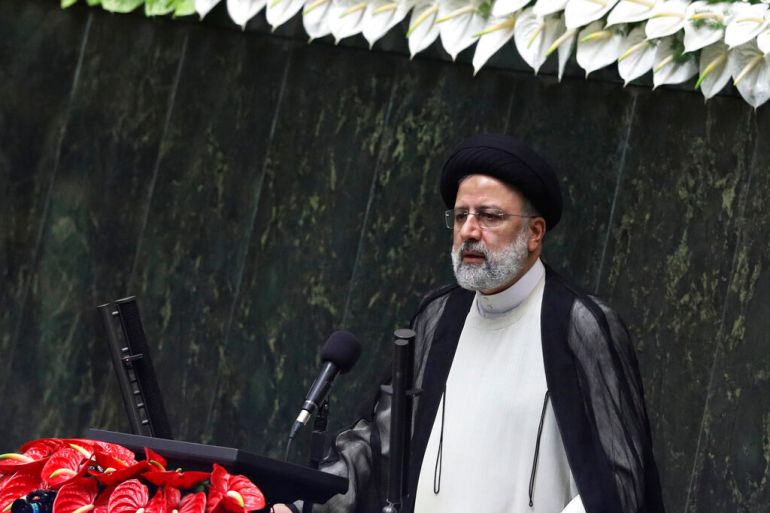Iran’s Raisi says Trump must face justice for Soleimani killing
President Ebrahim Raisi urges formation of a ‘fair court’ in which former President Trump and other US officials are tried.

Tehran – Iran’s President Ebrahim Raisi has said former United States President Donald Trump must face justice for his role in the assassination of top general Qassem Soleimani two years ago, or else Iran will have revenge.
In a televised speech on Monday, the Iranian president said as the “main criminal and killer” who ordered the deadly drone attack on Soleimani’s convoy in Iraq, Trump must face “God’s ruling” and suffer “qisas”, which is the Islamic term for retaliation in kind.
Keep reading
list of 3 itemsUS official meets with Israeli PM on Iran nuclear deal talks
Iran launches rocket into space as nuclear talks continue
Raisi called for the formation of a “fair court” in which Trump, former Secretary of State Mike Pompeo and other American officials are sentenced and punished.
If not, he said, “don’t doubt, and I tell this to all American statesmen, that the hand of revenge will come out of the ummah’s [nation’s] sleeve”.
Iran has said Soleimani, one of the most powerful figures in the country at the time, was on a diplomatic mission in Baghdad by invitation of the Iraqi government when the US targeted him near the city’s airport.
At the time, Iran promised “harsh revenge” and days later fired more than a dozen missiles at two US bases in Iraq that caused no casualties. The country later set the complete withdrawal of American military forces from the region as its ultimate goal as it pledged revenge for the killing.
Meanwhile, judiciary officials have promised to continue following up on the assassination in local and international venues. The country had previously requested Interpol “red notices” for the arrest of Trump and dozens of other US officials.
A local court was set up on Monday, and officials have invited the Iranian public to formally register any grievances they may have with foreign powers for assassinating the general.
Iran has also called on the United Nations General Assembly and the Security Council to issue resolutions against the US and Israel – which Iranian officials have accused of providing assistance for the drone attack – to condemn them and discourage similar attacks in the future.
‘School of Soleimani’
Raisi on Monday delivered his remarks at an event in Tehran’s Grand Mosalla to mark the second anniversary of the killing of the general. The event was televised live and included singing, reciting of poetry, flag-waving and speeches.
A week of events and programmes to commemorate the former commander of the Quds Force of the Islamic Revolutionary Guard Corps (IRGC) began on Friday and continued on Monday, with gatherings in Soleimani’s hometown of Kerman and other cities across the country.
The event in Tehran was attended by high-ranking officials and envoys of regional allies like Palestine, Syria and Yemen who are part of the so-called “resistance axis” supported by Iran and expanded by Soleimani for decades.
During his speech, Raisi also painted Soleimani as a man who was more than a mere person “and became a culture, a way, a school”.
“He is not a person, he is a school. And this school is neither destroyed by terror nor by missiles,” the president said.
Raisi said the general never feared the US even as he was fully aware of its military power, “and believed from the depths of his soul that America can’t do a damn thing against us”, echoing a phrase favoured by Supreme Leader Ayatollah Ali Khamenei.
Raisi also said Soleimani was a man who mastered both the battlefield and diplomacy, in what appeared to be a barb at former Foreign Minister Mohammad Javad Zarif, who had said in a leaked audio tape in April that he at times had to “sacrifice” diplomacy for the advancement of field operations across the region.
More events to come
Iranian media was awash with content about Soleimani on Monday, and a documentary on him was slated to be aired soon by state television. Cities were filled with posters of Soleimani, at times pictured next to Iraqi commander Abu Mahdi al-Muhandis, who was part of Soleimani’s convoy and was also killed along with several others in the drone attack.
A student gathering was organised Sunday night outside the Swiss embassy in Tehran, which represents US interests in the decades-long absence of formal relations. The participants shouted slogans and burned US flags in the street.
Events are expected to continue every day until Friday, when officials have planned an exhibition showcasing Iranian missiles to mark the IRGC’s missile attacks on the US bases two years ago.
In the early hours of Monday, at least two major Israeli media companies came under cyberattacks. The website of the Jerusalem Post and the Twitter account of Maariv appeared to be hacked as they posted content praising Soleimani and threatening Israel.
An image that they both posted showed a picture from the IRGC’s recent five-day military drill, in which a mockup of Israel’s Dimona nuclear facilities were blown up using missiles and drones. A fist guiding the missile bore Soleimani’s famous ring, with the words, “We are close to you where you do not think about it” on the image.
Maariv Twitter feed pic.twitter.com/VmTtpnuXgh
— The Cradle (@TheCradleMedia) January 3, 2022